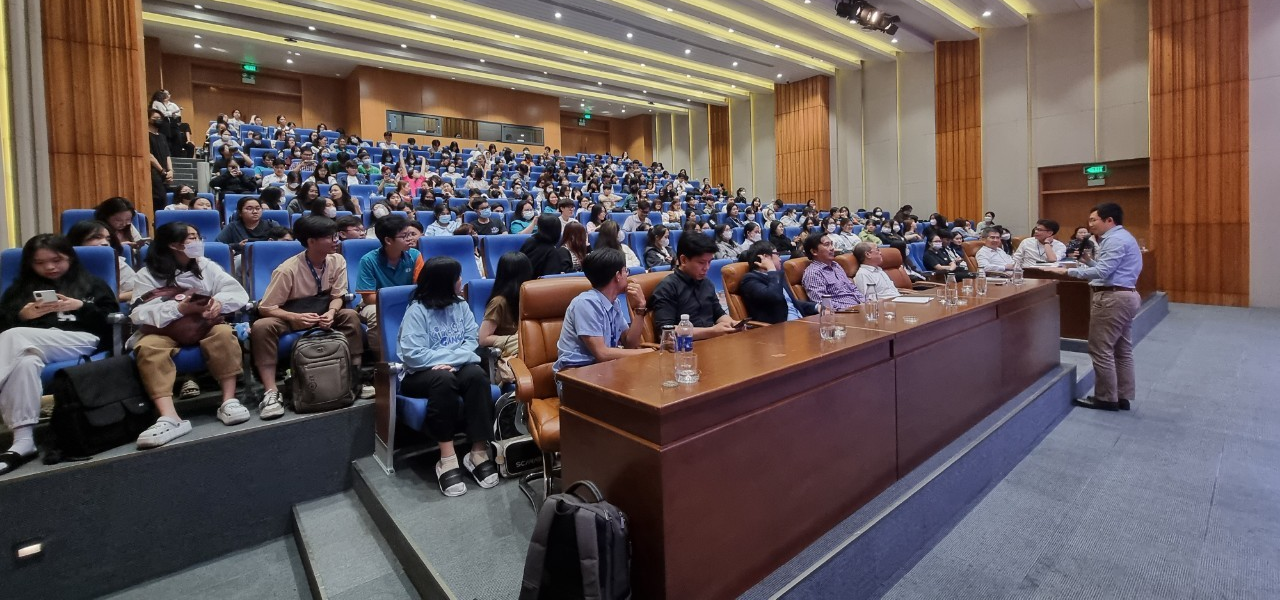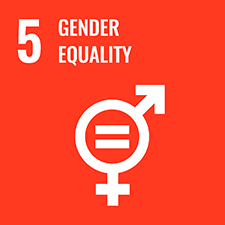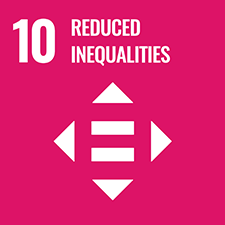
CELG seminar "Gender gap and labor market: Nobel Prize 2023 in economic sciences and research potential in Vietnam" by UEH College of Economics, Law and Government
13 Nov, 2023
The academic seminar that introduced the 2023 Nobel Prize in Economic Sciences took place on November 3, 2023 and garnered an attendance of approximately 350 individuals at Hall B1.302, 279 Nguyen Tri Phuong, Ward 5, District 10. Graduate students, full-time university students from various academic disciplines, and lecturers from various UEH schools attended the seminar in considerable numbers.
On the side of the UEH College of Economics, Law and Government, there was the participation of Associate Professor, PhD. Pham Khanh Nam - Vice rector in charge of the College of Economics, Law and Government; Associate Professor, PhD. Vo Tat Thang - Dean of the School of Economics and researchers in labor economics; and teachers from a variety of schools and institutes of UEH.
.jpg)
The Royal Swedish Academy of Sciences has decided to award the Sveriges Riksbank Prize in Economic Sciences in Memory of Alfred Nobel 2023 to Professor Claudia Goldin (Harvard University, USA). Professor Goldin was honored for her significant study on the subject of women's involvement in the labor market, which was conducted within the Department of Economics. A comprehensive dataset covering two centuries that captures information pertaining to women's incomes and contributions inside the labor sector. This CELG seminar started by introducing and engaging in a comprehensive discussion surrounding two following attracted presentations.
• Topic 1: The Nobel Prize in Economic Sciences 2023: Claudia Goldin and the Economics of Gender in the Labor Market
During the presentation, Dr. Dang Dinh Thang provided a comprehensive summary of the important research conducted by Professor Claudia Goldin. Professor Goldin's research focused on the evolving role of women in the labor market within the dynamic economic scenery of the United States. Her work has significantly influenced the field of gender economics research and garnered considerable attention from researchers across the world.
.jpg)
Dr. Dang Dinh Thang - Postdoctoral researcher at the Center for Reproduction and Health, Norwegian Center of Research Excellence at the Norwegian Institute of Public Health (NIPH), Research Fellow at Environment for Development – EfD UEH
Prof. Goldin has been a trailblazer in pioneering universal studies on factors influencing women's participation in the labor market, such as family dynamics, the birth of the first child, income, expectations, diversification of professions, job nature, increased access to education, and the spread of contraceptive use. She also suggested research gaps in women's achievements in the labor market, including natural experiments on policy changes affecting gender gaps, the impact of having a first child, workplace structure and flexibility, various unconventional causes, and policy tools using macro and micro research methods like cross-country data comparison and individual data analysis (Applied Micro Economics). Specifically, Goldin addressed the first reason for women's labor market participation as national policies on maternity support, noting how child care post-childbirth significantly affects women's return to work. The influence of family and friends (Family peer effects) is most evident from the second year after childbirth, following the end of maternity support policies (Nicoletti, Salvanes & Tominey, 2018). Cultural impacts and social norms, particularly in socialist countries, have been shown to encourage higher rates of women returning to work post-childbirth compared to capitalist countries (Boelmann, Raute & Schonberg, 2022). Particularly, Prof. Goldin examined the impact of having a first child (Motherhood impact) through the child penalty index, revealing that while both men and women experience reduced labor costs upon having their first child, women achieve less in the labor market by over 20% (Kleven et al., 2019). This finding is significant for developing more suitable maternity support policies based on specific characteristics. Kleven, Landais, and Leite-Mariante (2023) conducted a study on the child penalty in Ho Chi Minh City and other regions in Vietnam, finding that the penalty for women in Ho Chi Minh City is higher compared to other areas, with a national average penalty of 1.2%. Additionally, various related studies such as government policy interventions on women's labor market contributions (Bertrand et al., 2019), mental health care's impact on improving the labor market (Baranov et al., 2020), workplace harassment and violence (Folke & Rickne, 2022; Adams-Prassl et al., 2023), and economics of the third gender (LGBT) in the workplace (Drydakis, 2022) are hot topics in recent world-renowned journals contributing to gender economics research.
Vietnam has one of the world's highest women labor market participation rates, with the Northern region showing higher participation than the South due to the influence of socialist culture and new economic opportunities (Huynh and Ku 2023). However, Vietnam currently lacks extensive gender economics research, presenting potential topics to explore gender differences in its labor market.
- Topic 02: Gender economics research potential in Vietnam
.jpg)
Dr. Nguyen Phuc Canh - Lecturer in the School of Public Finance and the Institute for Agricultural and Health Policy Research, UEH-CELG.
Gender inequality manifests in various forms, and Dr. Nguyen Phuc Canh has highlighted evidence of harmful practices in Vietnam, such as domestic violence, detrimental customs and behaviors towards women and children, undervalued traditionally female tasks, and limited female leadership in businesses. Recently, there has been a decline in child marriage and harmful customs in ethnic minority areas, with women gaining more rights to participate in state agencies and high-level leadership roles (Source: Inter-Parliamentary Union). Research themes on gender inequality from 2000 to 2021 primarily focused on income, societal roles, financial decisions, and religion, among men and women. However, recent years have seen new topics of interest such as female entrepreneurship, women's relationships with peers and family, and their participation in corporate leadership (Belingheri et al., 2021).
According to Dr. Nguyen Phuc Canh, gender inequality research can focus on issues like access to education, government policy impacts, societal and relational influences, and family dynamics. The subject of gender inequality extends beyond men and women, including the increasingly recognized third gender globally. Causes of gender inequality worth examining include the post-COVID-19 pandemic situation, inequality among ethnic groups, the third gender, gender equality in green transitions, and in designing educational programs.
The CELG Seminar garnered attention from lecturers, researchers, and students, with numerous questions raised during the interaction session. Despite limitations in the volume of global and Vietnam-specific gender inequality research, this presents an opportunity for researchers and students to engage in upcoming gender economics studies. Research in gender economics in Vietnam can significantly contribute to promoting gender equality, socio-economic development, and building a fairer society. Insights from the seminar speakers provide educators, researchers, and students with valuable knowledge and new directions for research, contributing to the United Nations' future goals of addressing gender inequality.
.jpg)
Discussion and exchange at the Seminar:
Additional images of the CELG Semninar:
.jpg)
.jpg)
.jpg)
.jpg)
.jpg)
.jpg)
News, photos: UEH College of Economics, Law and Government
References:
- Nicoletti, C., Salvanes, K. G., & Tominey, E. (2018). Response of parental investments to child’s health endowment at birth. In Health Econometrics (pp. 175-199). Emerald Publishing Limited.
- Kleven, H., Landais, C., Posch, J., Steinhauer, A., & Zweimüller, J. (2019, May). Child penalties across countries: Evidence and explanations. In AEA Papers and Proceedings (Vol. 109, pp. 122-126). 2014 Broadway, Suite 305, Nashville, TN 37203: American Economic Association.
- Boelmann, B., Raute, A., & Schonberg, U. (2021). Wind of change? Cultural determinants of maternal labor supply.
- Kleven, H., Landais, C., & Leite-Mariante, G. (2023). The child penalty atlas (No. w31649). National Bureau of Economic Research.
- Bertrand, M., Black, S. E., Jensen, S., & Lleras-Muney, A. (2019). Breaking the glass ceiling? The effect of board quotas on female labour market outcomes in Norway. The Review of Economic Studies, 86(1), 191-239.
- Baranov, V., Frost, A., Hagaman, A., Simmons, J. G., Manzoor, M. S., Biroli, P., ... & Maselko, J. (2022). Effects of a maternal psychosocial intervention on hair derived biomarkers of HPA axis function in mothers and children in rural Pakistan. SSM-Mental Health, 2, 100082.
- Folke, O., & Rickne, J. (2022). Sexual harassment and gender inequality in the labor market. The Quarterly Journal of Economics, 137(4), 2163-2212.
- Abdel-Rahman, S., Awwad, F. A., Qasim, M., & Abonazel, M. R. (2023). New evidence of gender inequality during COVID-19 outbreak in the Middle East and North Africa. Heliyon, 9(7).
- Drydakis, N. (2022). Sexual orientation discrimination in the labor market against gay men. Review of Economics of the Household, 20(3), 1027-1058.
- Belingheri, P., Chiarello, F., Fronzetti Colladon, A., & Rovelli, P. (2021). Twenty years of gender equality research: A scoping review based on a new semantic indicator. Plos one, 16(9), e0256474.




![[Research Contribution] Criminal Procedure for Prosecuting Commercial Legal Entities: New Regulations, Challenges, and Enforcement Solutions](/images/upload/thumbnail/ueh-thumbnail-639078027620151681.png)


![[Research Contribution] Why Are Talented Employees Leaving 5-Star Hotels in Vietnam? The Answer May Surprise You](/images/upload/thumbnail/ueh-thumbnail-639078020304147834.png)
![[Research Contribution] Bilingual Parenting in Two Vietnamese Families: A Journey of Return and Departure](/images/upload/thumbnail/ueh-thumbnail-639078009718944082.png)

![[Research Contribution] Teacher Training Workshops: How to Help English Teachers Recognize and Effectively Teach Pragmatics](/images/upload/thumbnail/ueh-thumbnail-639077999884415686.png)

![[Research Contribution] English Teacher Educators' Understanding of Pragmatics and the Challenges in Teaching: A Study from Vietnam](/images/upload/thumbnail/ueh-thumbnail-639077992223047657.png)